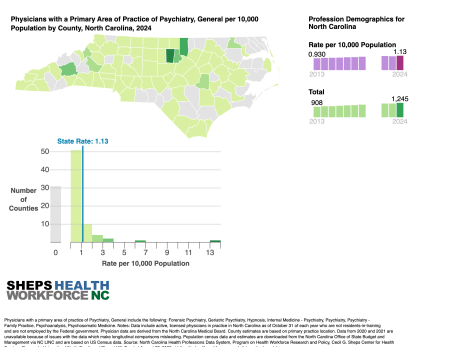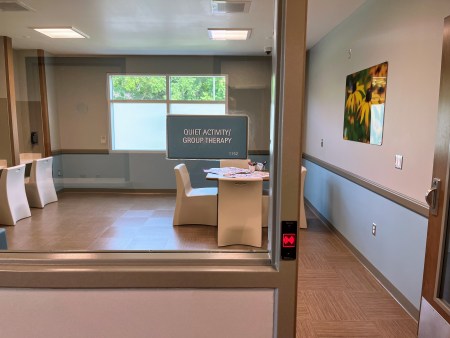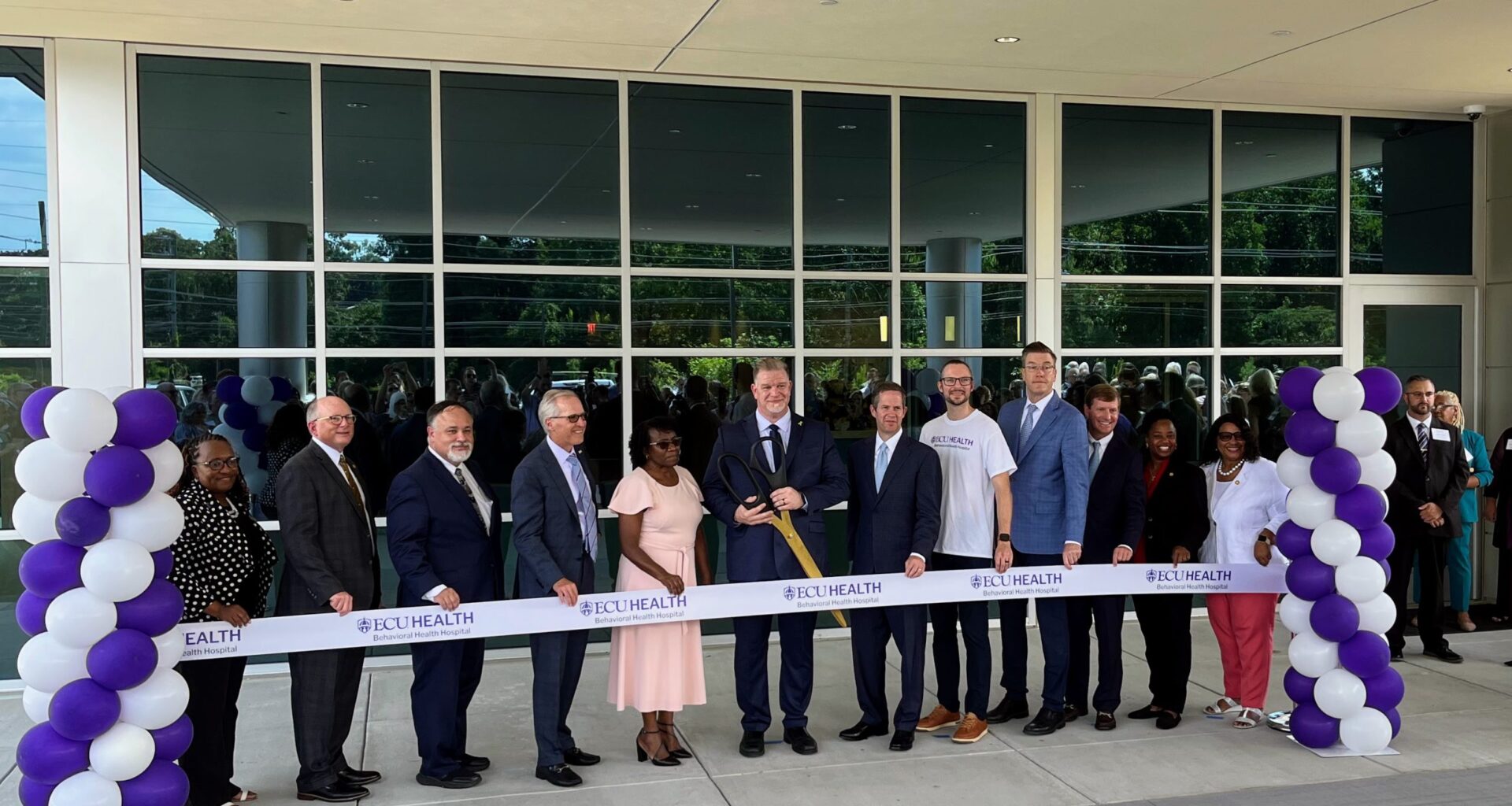By Taylor Knopf
A new psychiatric hospital in Greenville will begin serving patients in eastern North Carolina later this month.
ECU Health Behavioral Health Hospital is a new 144-bed facility intended to provide inpatient and intensive outpatient psychiatric services to adults and children; it will open with a 24-bed unit designated for pediatric patients.
The hospital is a joint venture between ECU Health, a nonprofit health system based in Greenville that serves eastern North Carolina, and Tennessee-based Acadia Healthcare, a for-profit behavioral health provider with 270 facilities across the United States and Puerto Rico. Since the plans for the Greenville hospital were announced in 2022, the for-profit behavioral health company has been investigated by a Congressional committee and the U.S. Department of Justice over its billing practices and treatment of patients.
Despite Acadia’s troublesome record, local and state health leaders expressed great excitement over the new facility at a ribbon-cutting event in late August.
 The new ECU Health Behavioral Health Hospital in Greenville will begin accepting patients on Sept. 24, 2025. Credit: Taylor Knopf
The new ECU Health Behavioral Health Hospital in Greenville will begin accepting patients on Sept. 24, 2025. Credit: Taylor Knopf
“This new behavioral health hospital symbolizes our purpose at ECU Health: expanding access, improving outcomes and treating the whole person, mind, body and spirit,” said ECU Health CEO Michael Waldrum. “It ensures that whether you live in a small, rural farming town, a coastal community, or anywhere in between, you have access to world-class behavioral health care close to home.”
State health leaders have been trying to increase availability of behavioral health services and recruit doctors and speciality providers to rural, underserved areas. They say this new hospital will do both.
Filling a health desert
There are 31 counties in North Carolina with no psychiatrist, and most of those are in the eastern half of the state. There are even fewer subspeciality mental health providers. For example, 67 of North Carolina’s 100 counties have no child psychiatrist, according to data tracked by the University of North Carolina’s Sheps Center.
Patients in eastern North Carolina often have to travel to the Triangle area for intensive psychiatric services, or they are shuttled across the state to far-flung available beds when they experience mental health crises.
“Patients have had to take their parents long distances to get treatment for Alzheimer’s,” said Michael Lang, chair of psychiatry and behavioral medicine at ECU Health, during the ribbon-cutting ceremony. “Parents have had to drive equally long distances and wait years to get their children evaluated for Autism Spectrum Disorder. Our neighbors and friends battling substance abuse may sit in an emergency department for weeks waiting to get to a facility that can provide them the health they need.”
 Health care workforce data tracked by the UNC Sheps Center shows 31 counties in North Carolina have no psychiatrists and the statewide rate is 1.13 psychiatrists per 10,000 people. Credit: UNC Sheps Center
Health care workforce data tracked by the UNC Sheps Center shows 31 counties in North Carolina have no psychiatrists and the statewide rate is 1.13 psychiatrists per 10,000 people. Credit: UNC Sheps Center
With a new psychiatric facility in eastern North Carolina, patients won’t have to go quite as far for support. Lang said the plan is to break ground on an outpatient mental health center in 2026 next to the new hospital for appointments after patients are discharged from the hospital or for other outpatient evaluations.
The new hospital in Greenville will be staffed by ECU Health physicians and be a teaching hospital for students and residents at East Carolina University’s Brody School of Medicine. Local health leaders hope that by training mental health providers in Greenville, more will choose to stay in eastern North Carolina — an area with a shortage of mental health providers. Lang said that with the opening of the new facility, the school of medicine will be able to double its psychiatric residency cohort.
“Along with many other areas in this country, we have struggled to bring the providers here that can provide the care necessary to give these people what they deserve,” Lang said. “These providers will live here. They will train here. And they will grow here to provide care for the patients of eastern North Carolina as members of our community.”
The nurses, dietitians and other hospital staff will be hired by Acadia, according to Lang. Acadia operates several outpatient facilities in North Carolina, but this joint-venture hospital in Greenville is the company’s first inpatient facility in the state. When asked about Acadia’s troubling record, Lang emphasized that the structure of this partnership means that ECU Health physicians will provide care to the patients.
“We will be doing what’s right for the care of eastern North Carolina,” he told North Carolina Health News.
Acadia’s troubled past
Last year, Acadia faced waves of scrutiny from multiple government entities and national media.
In June 2024, the U.S. Senate Finance Committee released a report titled Warehouses of Neglect, in which it accused four of the nation’s largest behavioral health companies, including Acadia, of putting profits above the safety and treatment of children placed in their care.
Some children with complex mental health needs are placed in long-term psychiatric treatment with a goal of receiving specialized intensive care, but the Senate committee’s investigation found that too often that doesn’t happen. The facilities, instead, “offer minimal therapeutic treatment in deficient physical settings with lean staff composed of non-professionals, which maximizes per diem margins,” according to the report.
 A group therapy room inside the new ECU Health Behavioral Health Hospital, which will serve adults and children. Credit: Taylor Knopf
A group therapy room inside the new ECU Health Behavioral Health Hospital, which will serve adults and children. Credit: Taylor Knopf
U.S. Sen. Ron Wyden (D-Oregon), committee chair at the time, said that what children experienced in these facilities “reads like something from a horror novel.” Acadia’s largest competitor, Universal Health Services, was also heavily referenced throughout the committee report and operates three facilities in North Carolina. NC Health News has published in-depth reports on repeated safety violations at two UHS-owned facilities: Holly Hill Hospital and Brynn Marr Hospital.
In September 2024, The New York Times reported that patients were often held in Acadia facilities — often against their will — for financial reasons rather than medical ones, according to more than 50 current and former Acadia executives and staff members interviewed by the Times.
Acadia said it strongly disagreed with how the Senate’s report portrayed its facilities. The company released a statement on the media coverage and said “reporting on these issues has not reflected the many clinical considerations that inform the appropriate care for a person facing a mental health crisis, including whether and for how long they should receive direct care in a facility.”
Multimillion-dollar settlement
Just weeks after the New York Times article, the U.S. Department of Justice announced that Acadia entered a nearly $20 million settlement agreement to resolve allegations that it knowingly billed Medicare, Medicaid and Tricare (insurance for military members and their families) for unnecessary inpatient behavioral health services.
The settlement also resolved allegations that Acadia failed to sufficiently staff its facilities and failed to properly train and supervise its employees, which the Department of Justice claimed resulted in assaults, elopements, suicides and other harm to patients.
The department claimed that Acadia facilities failed to provide active psychiatric treatment — including individual and group therapies — and that Acadia hospital staff failed to create and update patients’ treatment plans.
 The new ECU Health Behavioral Health Hospital in Greenville has five outdoor courtyard spaces for patients to get fresh air and sun. Credit: Taylor Knopf
The new ECU Health Behavioral Health Hospital in Greenville has five outdoor courtyard spaces for patients to get fresh air and sun. Credit: Taylor Knopf
Acadia entered the settlement agreement without admitting guilt. In a statement, Acadia CEO Chris Hunter said the company was “committed to taking action on incidents that fall short of our rigorous standards and are making investments necessary to establish Acadia as the leading behavioral healthcare provider for high-acuity and complex needs patients.”
Then in October 2024, The New York Times reported that the Veterans Affairs Department launched its own investigation into Acadia to determine if the company defrauded federal health insurance programs by holding patients longer than medically necessary.
What to expect in NC
NC Health News asked Tyler Davis, CEO of the new ECU Health Behavioral Health Hospital, about the multiple allegations Acadia has faced in the last year and what North Carolinians can expect from the new hospital.
“I’ve been with Acadia for 11 or 12 years, I’ve never been part of an organization that did anything questionable or negative, so I’ve had nothing but positive experiences,” Davis said. “I’m a nurse by background, so my comfort level is caring for patients. And I think if you keep that at the heart of everything that you do, make that the priority, everything turns out exactly as it should.”
State Rep. Tim Reeder (R-Ayden) attended the ribbon-cutting event for the new hospital as a lawmaker representing his constituents and an emergency department physician with ECU Health. From his perspective, this new facility is vital to patients and the future success of rural health care.
 ECU Health Behavioral Health Hospital CEO Tyler Davis and state Representative and ECU Health physician Tim Reeder together on a tour around the new facility during a ribbon-cutting event in late August. Credit: Taylor Knopf
ECU Health Behavioral Health Hospital CEO Tyler Davis and state Representative and ECU Health physician Tim Reeder together on a tour around the new facility during a ribbon-cutting event in late August. Credit: Taylor Knopf
“We send too many of our patients, especially children, away from their families and their support, and that really is negative on their ability to recover,” he told NC Health News. “From the policy and the legislative side, developing healthcare services in rural areas is vitally important for the future success of the state.”
When asked if he was concerned about Acadia’s past reputation affecting the care patients will receive, Reeder leaned on his experience working with ECU Health.
“I’ve been proud to be part of ECU Health for a number of years,” he said. “I know the physicians who are going to be working here, and I have to believe that this is going to be a facility that’s going to deliver high quality care in an educational environment.”
Similar to the joint venture with ECU Health, Acadia has partnered with other nonprofit health organizations to open inpatient psychiatric facilities. However, these partnerships haven’t always shielded the hospitals from the problems reported across for-profit psychiatric facilities. Incident reports out of an Acadia facility in Columbus, Ohio, which bears the name Mount Carmel — a Catholic health system founded by nuns — were so concerning that a police sergeant with the local police department’s mental health and addiction services response unit sounded the alarm last year and referred the hospital for investigation.
In North Carolina, leaders at the new ECU Health Behavioral Health Hospital are ironing out the final details, such as the Medicaid reimbursement rate and hiring of support staff, before the hospital begins accepting patients on Sept. 24.
Republish This Story
Republish our articles for free, online or in print, under a Creative Commons license.

